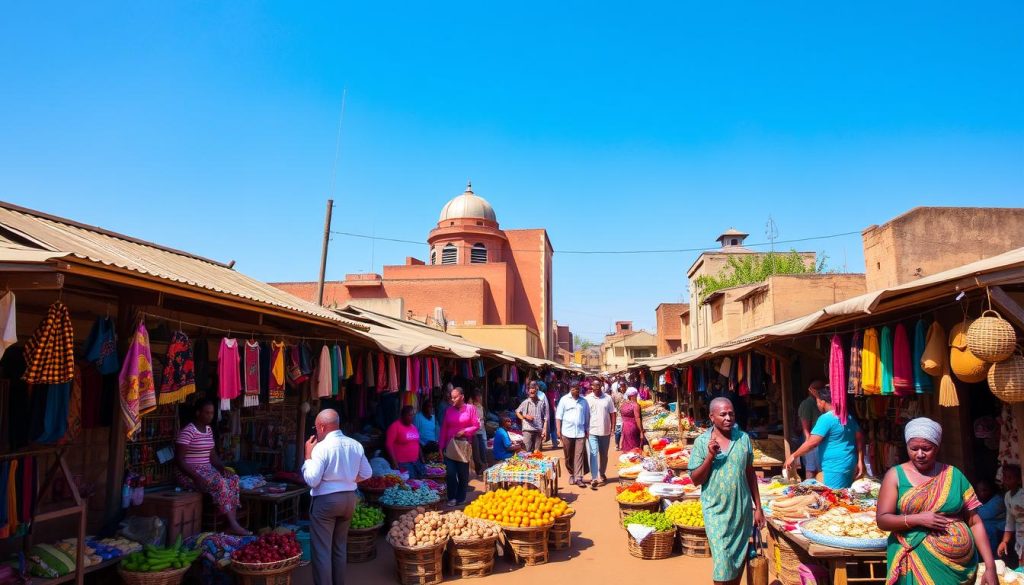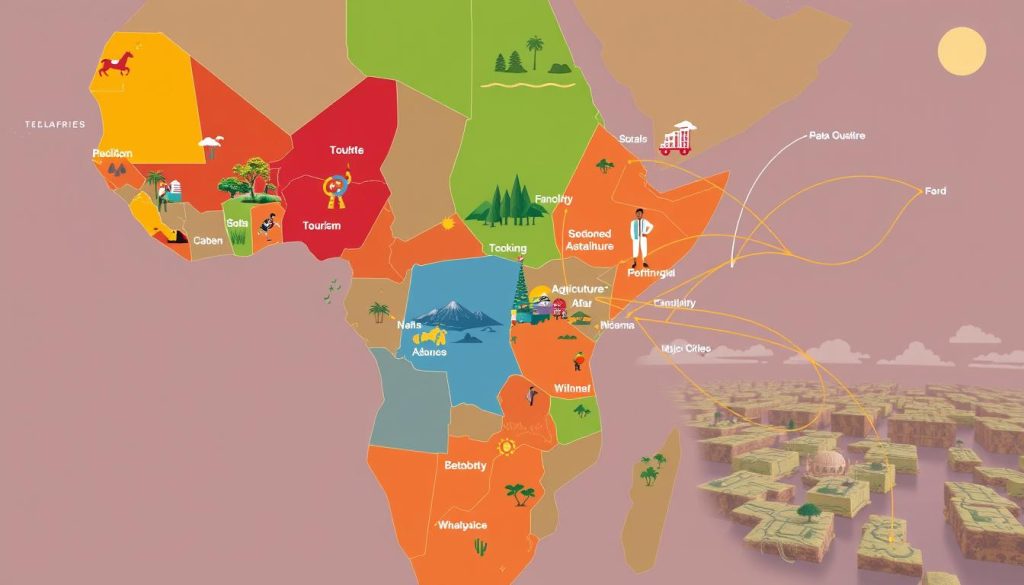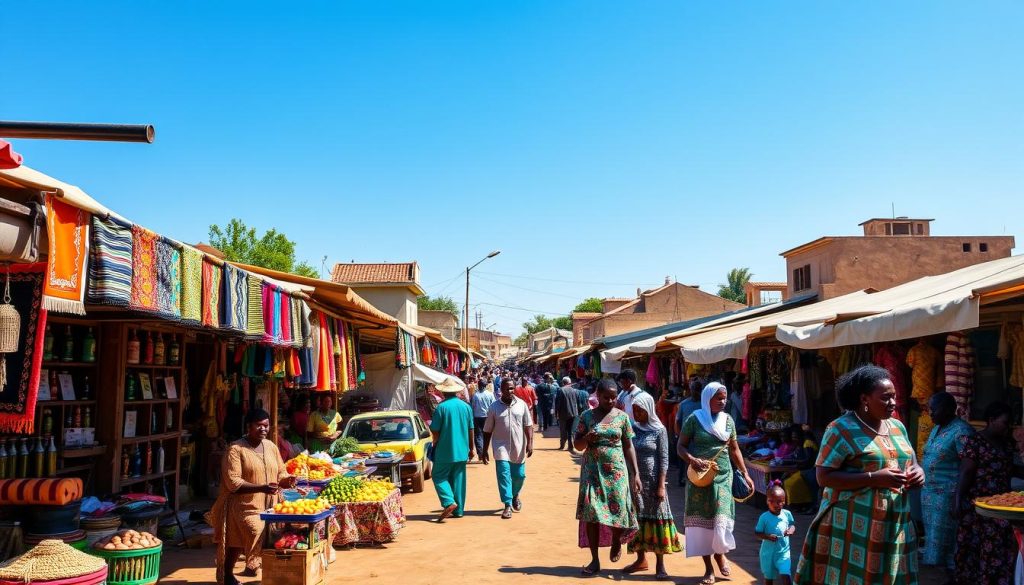Starting a small business in Africa is both exciting and tough for American entrepreneurs. The continent has lively economies and a wide range of markets. This makes it a great place for new business ideas.
To do well, entrepreneurs need to know the local business scene well. This includes the rules and the culture. Getting ready well can help a business grow and succeed in this changing world.
Understanding the African Market Landscape

The African market is full of chances, thanks to different people and strong economic growth. Many areas are changing fast because more people are moving to cities. This means there’s a bigger need for products and services.
Mobile phones are key in shaping the African market. More people are using them to get online, access money services, and shop online. This change is helping the growing middle class a lot.
The middle class is changing how people buy things in many areas. The UN Economic Commission for Africa says spending by consumers will go up. This shows the economy is stable and people are more confident in local markets.
Every region in Africa is different, with its own economic growth. This is because of things like resources, roads, and how well governments work. Knowing these differences helps business owners plan better and grab chances.
Agenda 2063 by the African Union has big plans for the continent. It wants Africa to be united, wealthy, and led by its people. This plan shows the huge potential in the African market and why it’s important to keep up with its changes.
Benefits of Starting a Business in Africa

Starting a business in Africa is full of benefits, especially for American entrepreneurs. It opens the door to new markets. This means you can reach a wide range of customers looking for fresh products and services.
The growth potential in Africa is huge. Businesses can grow and expand in ways they can’t in more established markets.
Operating costs in many African countries are lower than in Western nations. This means you can make more money and invest in your business. The environment is also ripe for innovation. Businesses can create solutions that meet local needs, giving them a competitive edge.
Africa is rich in natural resources. These can be used in industries like agriculture, mining, and energy. Plus, the government has policies that encourage foreign investment. This makes it easy for American entrepreneurs to set up shop in Africa.
In short, starting a business in Africa offers many advantages. These include lower costs, a chance to innovate, and support from the government. By diving into the African market, you can make a real difference in local economies and communities.
Challenges Faced by American Entrepreneurs

Starting a business in Africa comes with many challenges. American entrepreneurs need to know these to prepare for any obstacles.
Political instability is a big risk. Changes in government and policies can disrupt business. Also, poor infrastructure, like transport and energy systems, can slow down production and delivery.
Dealing with local laws can be tough. It’s hard for those not used to the legal system. Cultural differences can also cause misunderstandings in business.
The informal economy is common in Africa. This means some businesses don’t follow the rules. It makes it hard for entrepreneurs to compete fairly.
Changes in currency value add to the risk. This can affect prices and profits. Entrepreneurs must find ways to manage these risks.
Starting a small business in Africa as an American

Starting a business in Africa is a big step for American entrepreneurs. It’s important to understand the entrepreneurship landscape in Africa. You need to find a business model that fits local needs.
Following local laws can be tricky. You must do your homework on legal requirements. Also, knowing the local culture is key to success. Engaging with the community is crucial.
Key Considerations
Here are some important things to think about:
- Do your homework on what people want and like.
- Work with local businesses to get their insights.
- Learn about local business ways through training.
- Choose projects that help the community grow.
Potential Opportunities
Africa has many chances for business:
- Technology Sector: The digital world is growing fast here.
- Agribusiness: Africa’s farms offer great chances for new ideas and money.
- Renewable Energy: Solar and wind power are getting more popular as energy needs grow.
Choosing the Right Country for Your Business

American entrepreneurs looking to enter the African market must choose wisely. The right country is key to success. Look at political stability, economic growth, and how easy it is to do business. These factors greatly affect your venture’s success.
Countries like Nigeria, Kenya, and South Africa are top choices for entrepreneurs. Each offers unique opportunities and challenges:
- Nigeria: It has a big population and a lively economy, making it a great market. But, investors should watch out for security issues and rules.
- Kenya: Kenya is known for its tech scene and innovation. It’s improving its business environment, making it more appealing.
- South Africa: It has a solid infrastructure and financial systems, acting as a gateway to Africa. But, labour issues might be a problem.
Knowing these differences helps make the right choice for your business. American entrepreneurs should pick African countries that fit their goals. This will lead to better results.
Legal and Regulatory Requirements

For American entrepreneurs, knowing the legal setup in Africa is key. The area has its own set of rules for starting a business. Following these rules helps make a business look good and grow in a stable way.
Business Registration Processes
Registering a business in Africa involves several steps. These steps can change a lot from one country to another. Here are the main steps:
- Choosing a business type, like a limited company or being your own boss.
- Registering your business name with the right people.
- Getting the right licenses and permits for your industry.
- Registering with local tax authorities.
It’s smart to talk to local lawyers to understand the business registration process in Africa. Each country has its own rules and steps.
Tax Obligations and Incentives
Taxes in Africa can be tricky but also offer chances for businesses. Entrepreneurs need to know about:
- Corporate tax rates, which can vary by country.
- VAT rules that businesses must follow.
- Tax breaks that might attract foreign investors.
Knowing about taxes in Africa and the tax breaks available can really help a business make more money. It’s a good idea to get advice from financial experts to make the most of tax laws.
Understanding Local Culture and Consumer Behaviour

To succeed in the African market, you must grasp the local culture. Cultural values and social norms shape how people shop and what they buy. American entrepreneurs need to understand these cultural differences to craft effective strategies.
Different areas in Africa have their own unique cultural practices. By embracing these differences, businesses can improve their marketing and product placement. It’s crucial for entrepreneurs to focus on several key areas:
- Language preferences and communication styles
- Family and community influence on buying decisions
- Respect for local traditions and customs
- Understanding gender roles in consumer behaviour in Africa
By adapting to these cultural aspects, businesses can gain more acceptance and build lasting relationships with customers. American companies entering Africa should invest in cultural training and local partnerships. This will help them navigate these complexities successfully.
Funding Options for Your Venture

Getting enough money for your business in Africa is key for American entrepreneurs. There are many ways to get the funds you need to start and grow. Knowing how local banks and financial institutions work is important.
Local Banks and Financial Institutions
Local banks are crucial for entrepreneurs. They offer loans, savings accounts, and more. Banks like Standard Bank and First National Bank have services for small to medium businesses.
Microfinance organisations also play a big role. They help entrepreneurs who can’t get regular loans. Kiva, for example, offers small loans for start-ups in Africa.
Impact investors are another important funding source. They look for businesses that help society and the environment. This way, funding in Africa supports businesses that care about the planet and people.
Building a Strong Business Network

Creating a strong network is key for new entrepreneurs in Africa. Knowing how to network in Africa is crucial for success. Making connections with local business owners opens doors to new opportunities and market insights.
Connecting with government officials and industry experts boosts your reputation. Here are some tips for networking in Africa:
- Join business forums and expos to meet new partners and learn about the industry.
- Use LinkedIn to connect with professionals and join groups focused on entrepreneurship in Africa.
- Go to local workshops and seminars to talk directly with key players.
Being culturally aware is important in networking. Knowing local customs helps build trust and lasting relationships. Entrepreneurs should work hard to grow these connections, leading to successful partnerships and growth for all.
Marketing Strategies for African Markets

Marketing in Africa needs a smart mix of digital and social media. The young population and growing internet use make it easier to reach customers. Knowing how to use these platforms is key to success.
Utilising Digital Platforms
Digital marketing in Africa can be many things. Businesses should think about these ideas:
- Make a website that works well on phones.
- Use SEO to get found online more easily.
- Run ads online to target certain groups and places.
- Use email marketing to keep in touch with customers.
Social Media Engagement
Social media in Africa is a big chance for brands to talk to people. Using local influencers and making content that fits the culture can really help. Here are some tips:
- Find out which social media sites are popular in your area, like Facebook, Instagram, and Twitter.
- Make different kinds of content, like videos, infographics, and posts that people can interact with.
- Ask people to share their own content to build a community and trust.
- Keep an eye on how people react to your content and change your strategy if needed.
Success Stories of American Entrepreneurs in Africa

American entrepreneurs in Africa have shown great success. They have overcome big challenges and brought new ideas. Their work has changed local economies and helped communities.
In tech, startups like Andela have made a big difference. They help solve the skills gap in software development. This has grown Africa’s tech scene, showing American entrepreneurs can succeed here.
Agro-businesses are also doing well. Companies like Hello Tractor have changed farming with technology. This has made farming better and improved farmers’ lives.
Companies like Smile Train show that business can help people. They offer free surgeries for kids with cleft palates. This shows that making money and helping others can go together.
These stories are inspiring. They show how American entrepreneurs can make a positive change in Africa. They do this by being innovative and caring about the community.
Tips for Long-term Sustainability and Growth
For American entrepreneurs in Africa, success depends on a few key strategies. Continuous market research is essential. It helps understand changing consumer tastes and economic trends. This knowledge guides decisions and finds growth opportunities that match the market.
Using tools to collect data keeps businesses competitive and relevant. This ensures they stay ahead in a fast-changing market.
Being adaptable to market changes is vital for lasting success. This means being open to change and ready to adjust when needed. Regularly reviewing your business model helps make quick changes and innovations.
This approach not only helps businesses survive economic ups and downs. It also opens up new chances for growth.
Investing in people and creating a positive work culture is crucial for growth. Focusing on employee development and wellbeing boosts motivation and productivity. It also helps build a strong brand that values community.
By doing this, businesses gain loyalty and contribute to the local economy. This aligns with long-term success in Africa.
















